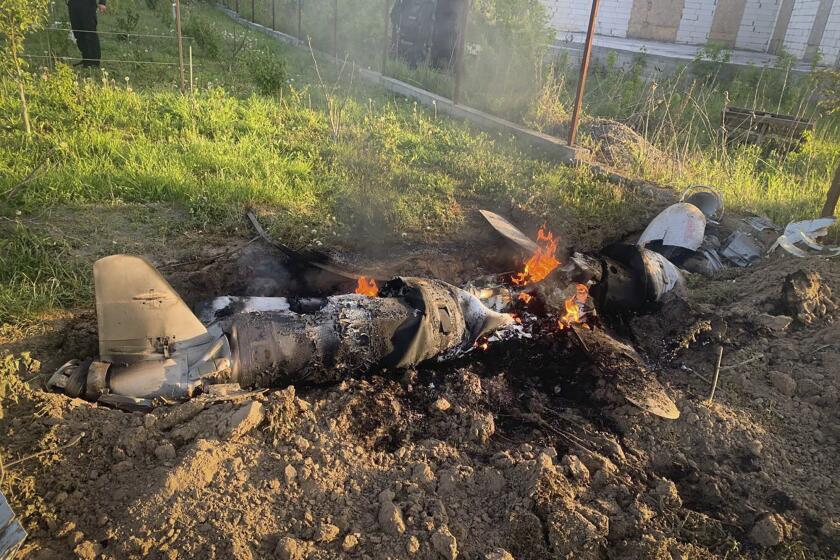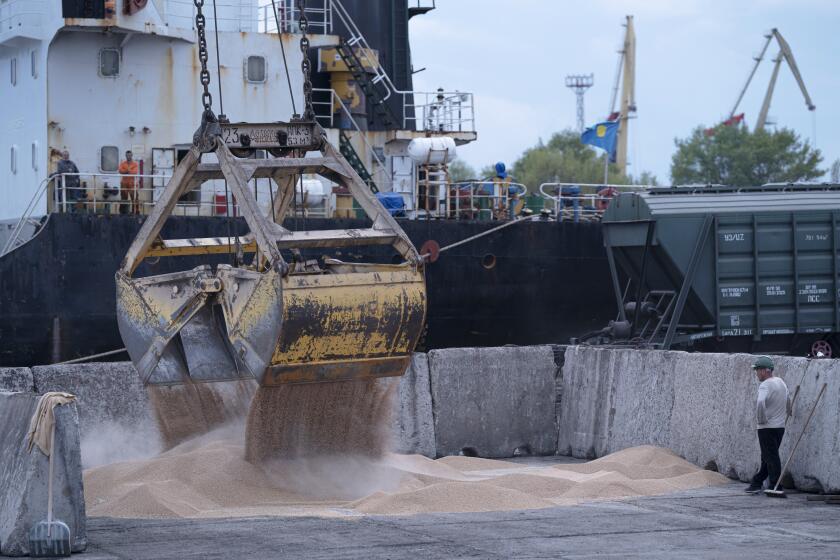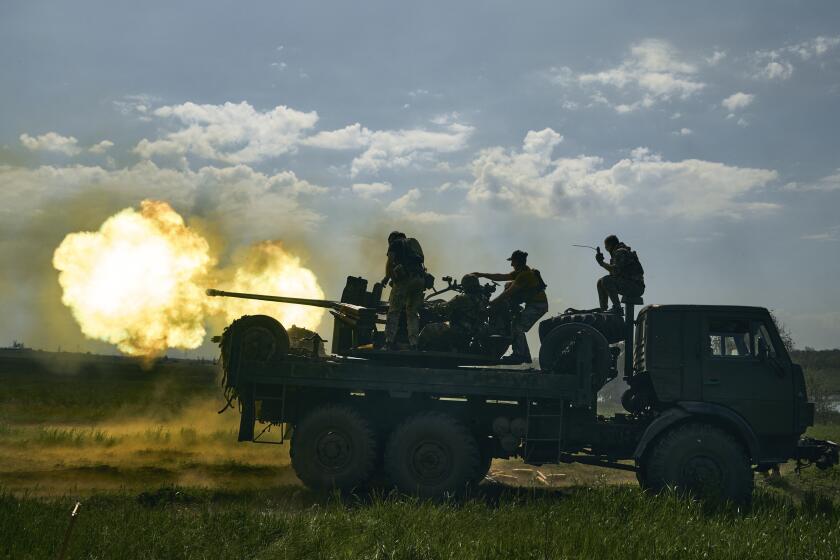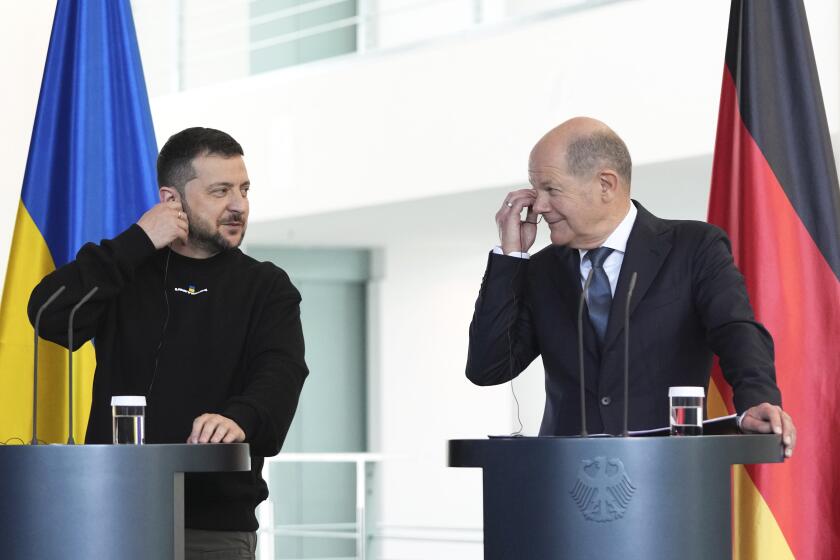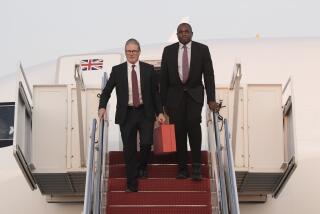Biden backs F-16 fighter jet training for Ukraine as Zelensky prepares to join G-7 summit
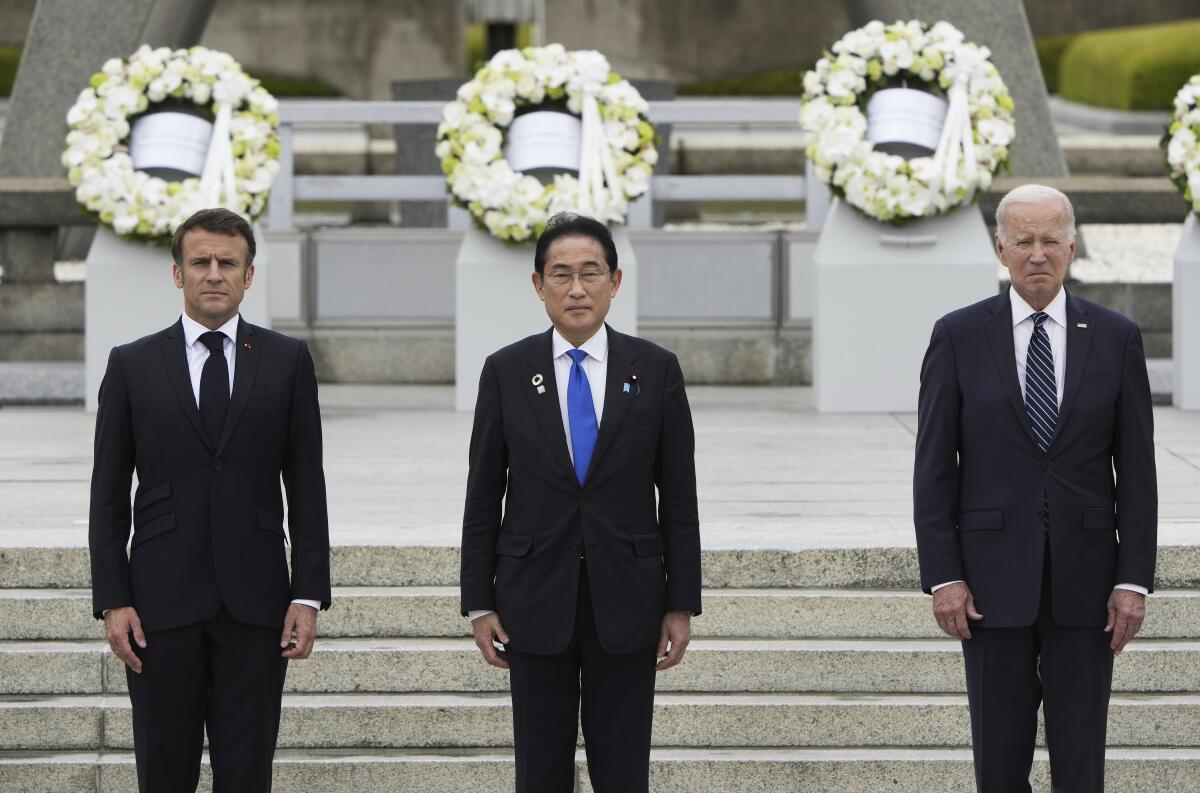
HIROSHIMA, Japan — President Biden on Friday endorsed plans to train Ukrainian pilots on U.S.-made F-16 fighter jets, according to two people familiar with the matter, as he huddled with leaders of the world’s most powerful democracies on plans to toughen punishments of Russia for its 15-month invasion of Ukraine.
The Group of 7 leaders are meeting in Hiroshima, Japan, where Ukrainian President Volodymyr Zelen- sky is to join them Sunday in his farthest trip from his country since the war began in February 2022.
The leaders heard for the first time of Biden’s backing of training Ukrainian pilots on advanced fighter jets, as a precursor to sending the jets to Ukraine.
The G-7 leaders also set out new sanctions on Moscow as well as plans to enhance the effectiveness of existing financial penalties meant to constrain Russian President Vladimir Putin’s war effort.
“Our support for Ukraine will not waver,” the G-7 leaders said in a statement released after closed-door meetings, vowing “to stand together against Russia’s illegal, unjustifiable, and unprovoked war of aggression against Ukraine.”
“Russia started this war and can end this war,” they said.
Officials say Russia launched cruise missiles at Ukraine’s capital and the Odesa region early Thursday, most of which were shot down by air defenses.
The F-16 training is to be conducted in Europe and will probably begin in the coming weeks. But Biden told the leaders that decisions on when, how many and who will provide the fourth-generation fighter jets for Ukraine to use in battle will be made in the months ahead while the training is underway.
That’s according to the people who spoke on condition of anonymity to discuss Biden’s private conversations with allies.
Zelensky for months has called for the supply of Western fighter jets to bolster his country’s defenses against Russia’s invasion, but has faced skepticism from the U.S. that they would turn the tide in the war. Now, as Ukraine has bolstered its air defenses with a host of Western-supplied antiaircraft systems, officials believe the jets could become useful in the battle and essential to the country’s long-term security.
Separately, Oleksiy Danilov, the secretary of Ukraine’s National Security and Defense Council, confirmed on national television that Zelensky would attend the summit.
Russia has agreed to extend by two months a deal that allows Ukraine to ship grain through the Black Sea to parts of the world struggling with hunger.
“We were sure that our president would be where Ukraine needed him, in any part of the world, to solve the issue of stability of our country,” Danilov said Friday. “There will be very important matters decided there, so physical presence is a crucial thing to defend our interests.”
Zelensky announced Friday that he had begun a visit to Saudi Arabia, where Arab leaders were holding a summit.
European allies in recent weeks have warmed to the notion of sending fighter jets to Ukraine, as have some members of Biden’s Cabinet, including Secretary of State Antony J. Blinken, who has emerged as a staunch advocate within the administration. Under export licensing rules, the U.S. needs to sign off on any allied effort to train Ukrainian pilots or to provide them with the jets.
The announcement came as the U.S. and its allies also announced a series of actions meant to tighten restrictions on sanctioned people and firms involved in Russia’s war effort. More than 125 individuals and organizations across 20 countries were hit with U.S. sanctions. The financial penalties were primarily focused on sanctions evaders connected to technology procurement for the Kremlin. The Commerce Department also added 71 firms to its own list.
There has been talk for months of a spring counteroffensive by Ukraine to wrest back territory from Russian forces, but the drive has yet to begin.
Additionally, new reporting requirements were issued for people and firms that have any interest in Russian central bank assets. The purpose is to “fully map holdings of Russia’s sovereign assets that will remain immobilized in G-7 jurisdictions until Russia pays for the damage it has caused to Ukraine,” a Treasury statement said.
Treasury Secretary Janet L. Yellen said the sanctions unveiled Friday “will further tighten the vise on Putin’s ability to wage his barbaric invasion and will advance our global efforts to cut off Russian attempts to evade sanctions.”
Russia is now the most sanctioned country in the world, but there are questions about the effectiveness of the financial penalties.
Breaking News
Get breaking news, investigations, analysis and more signature journalism from the Los Angeles Times in your inbox.
You may occasionally receive promotional content from the Los Angeles Times.
The G-7 nations said in Friday’s statement that they would work to keep Russia from using the international financial system to prosecute its war, would “further restrict Russia’s access to our economies” and would prevent sanctions evasion by Moscow.
They urged other nations to stop providing Russia with support and weapons “or face severe costs.”
The European Union was focused on closing loopholes and plans to restrict trade in Russian diamonds, Charles Michel, president of the European Council, told reporters Friday.
Putin’s nuclear threats against Ukraine, along with North Korea’s months-long barrage of missile tests and China’s rapidly expanding nuclear arsenal, have resonated with Japan’s push to make nuclear disarmament a major part of the summit. World leaders Friday visited a peace park dedicated to the tens of thousands who died in the U.S. bombing of Hiroshima, the world’s first nuclear attack.
Japanese Prime Minister Fumio Kishida, who represents Hiroshima in parliament, wants nuclear disarmament to be a major focus of discussions, and he formally started the summit at Hiroshima’s Peace Memorial Park.
The visit by world leaders to a park dedicated to preserving reminders of Aug. 6, 1945, when a U.S. B-29 dropped an atomic bomb over Hiroshima, provided a striking backdrop to the start of the summit.
An estimated 140,000 people were killed in the attack, and a fast-dwindling number of elderly survivors have ensured that Hiroshima remains synonymous with anti-nuclear peace efforts.
Like Ukraine, its eastern neighbor and fellow former Soviet republic, Moldova is struggling to keep from being turned into a puppet of Russia once more.
Biden, who scrapped plans to travel on to Papua New Guinea and Australia after his stay in Japan so that he can get back to debt-limit talks in Washington, arranged to meet Saturday on the G-7 sidelines with leaders of the so-called Quad partnership, made up of Japan, Australia, India and the U.S.
The four originally had been scheduled to meet in Australia as part of Biden’s effort to revitalize relationships in the Indo-Pacific.
As G-7 attendees made their way to Hiroshima, Russia unleashed yet another aerial attack on the Ukrainian capital. Loud explosions thundered through Kyiv during the early hours, marking the ninth time this month that Russian air raids have targeted the city after weeks of relative quiet.
G-7 leaders and invited guests from several other countries are also expected to discuss how to deal with China’s growing assertiveness and military buildup as concerns rise that it could try to seize Taiwan by force, sparking a wider conflict. China claims the self-governing island as its own, and its ships and warplanes regularly patrol near it.
Ukraine’s president, Volodymyr Zelensky, wins new military aid pledges as European allies fear a Trump return in the U.S. 2024 election.
In a bit of dueling diplomacy, Chinese President Xi Jinping is hosting the leaders of the central Asian countries of Kazakhstan, Kyrgyzstan, Tajikistan, Turkmenistan and Uzbekistan for a two-day summit in the Chinese city of Xi’an.
The G-7 leaders are due to discuss efforts to strengthen the global economy and address rising prices that are squeezing families and government budgets around the world, particularly in developing countries in Africa, Asia and Latin America. A U.S. official said the leaders would issue a joint communique Saturday highlighting a common approach toward dealing with China, as well as outline new projects in the G-7’s global infrastructure development initiative, which is meant to offer countries an alternative to China’s investment dollars.
The G-7 comprises Japan, the United States, the United Kingdom, France, Germany, Canada and Italy, as well as the European Union.
More to Read
Sign up for Essential California
The most important California stories and recommendations in your inbox every morning.
You may occasionally receive promotional content from the Los Angeles Times.
